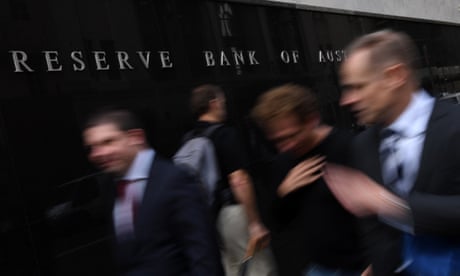- by foxnews
- 08 Apr 2025
Rising corporate profits major factor in Australia’s escalating inflation, report finds
Rising corporate profits major factor in Australia’s escalating inflation, report finds
- by theguardian
- 18 Jul 2022
- in news

Wages have had little or no effect on Australia's inflation rate in the past three years, according to new economic analysis from a leading thinktank.
As the treasurer, Jim Chalmers, rubbished what he called "dire warnings" from commentators about the impact of rising wages, a report from progressive thinktank the Australia Institute found rising corporate profits had been a major factor in Australia's inflation spike.
In the report, released on Monday, the institute analysed national accounts data to show that rising corporate profits had been a major factor in inflation and that wages had "no contribution" to inflation in the 2019-20 and 2020-21 financial years, and contributed just 0.6% of Australia's inflation in this current financial year.
"Australia isn't experiencing a wage-price spiral, it's at the beginning of a price-profit spiral," said Australia Institute chief economist, Dr Richard Denniss.
"The national accounts show it is rising profits, not rising costs, that are driving Australia's inflation. While workers are being asked to make sacrifices in the name of controlling inflation, the data makes clear that it is the corporate sector that needs to tighten its belt."
The report points out that wage growth was at record low levels, while the profit share was at a near-record share of GDP.
"While wage growth clearly has not been the driving force of recent increases in Australian inflation, or indeed inflation around the world, the continuing impact of Covid and the sharp increase in global energy prices associated with Russia's invasion of Ukraine clearly have," the report said.
Relying on methodology recently used by the European Central Bank, the Australia Institute analysed the GDP deflator - a different measure of inflation in the economy, as distinct from the consumer prices index (CPI) - to determine the role of profits and wages in the headline inflation number.
The report found that between 2013 and 2021 in Australia, labour costs "played almost no role in inflation (as measured by the GDP deflator)".
That included zero effect of wages on inflation in the previous two years and a small effect this financial year.
"Meanwhile profits have accounted for 2.5 percentage points of the increase in the GDP deflator (about 60 percent of the total)," the Australia Institute said.
The report noted that prices were rising faster than wages and other costs, which is leading to a sustained increase in the share of profits.
"Increasing prices in line with, or in excess of, rising costs is a choice to maintain or increase profit margins in Australia even though the profit share of GDP is at a near-record high," it said.
The interplay between wages and inflation became a major factor in the final weeks of the May election campaign, after the Labor party's commitment to lobby the Fair Work Commission for increases to the minimum wage.
Business groups and some economists claimed accelerating wages would exacerbate inflation, but Labor - in opposition and now in government - maintained that modest wage rises would not have a significant inflationary effect.
Chalmers, speaking to Sky News on Sunday, again reiterated that standpoint.
"Wages are not the reason why we've got this inflation. And so I don't share a number of the concerns which have been raised about some kind of destructive wage spiral," he said.
"We've still got real wages falling quite substantially. We want to see those wages growing in a sustainable way. And that means by making the economy more productive, so that there are lots of win-wins for employers and employees and we get living standards up."
"I don't share some of those kind of quite dire warnings about all of that."
Chalmers reaffirmed the government's belief that productivity growth was key to sustainable wage rises, and said this would be a factor in the upcoming jobs summit to be held in Canberra.
"What we hope that the Jobs and Skills Summit will do is bring people together around these big economic challenges," he said.
"We're not so naive to think that there will be unanimity around some of these issues, including some of the issues around wages. But we do hope and expect and we do want to see some sort of consensus emerging around skill shortages and labour shortages and strong and sustainable wages growth and training and migration."
Chalmers said that he expected "inflation will get a bit worse before it gets a bit better. But everybody understands that it will get better."
- by foxnews
- descember 09, 2016
Ancient settlement reveals remains of 1,800-year-old dog, baffling experts: 'Preserved quite well'
Archaeologists have recently unearthed the remarkably well-preserved remains of a dog from ancient Rome, shedding light on the widespread practice of ritual sacrifice in antiquity.
read more


